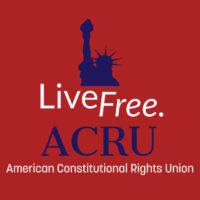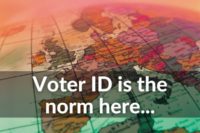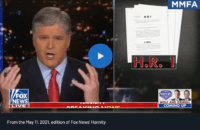Requiring voters to prove they are who they say they are in order to cast a ballot is a simple, common-sense measure that helps ensure honest elections.
Opponents of photo ID falsely charge that such requirements discriminate against poor and minority voters. Each time this claim has been used in the courts, plaintiffs have failed to produce evidence of any individual who was actually denied the right to vote for lack of a photo ID. Despite this fact, and that all demographic groups including African-Americans support voter ID laws, accusations of Jim Crow, the racist system that disenfranchised Southern blacks for generations, continue to be hurled with abandon.
The Supreme Court has stated that because voter ID is free, the inconveniences of going to the Bureau of Motor Vehicles, gathering applicable documents, or posing for a photograph are not substantial burdens on most voters’ right to vote. Nor do they represent a significant increase over the usual burdens of voting — registering or driving to a polling place. If people show up without an ID, they can cast a provisional ballot and bring in their ID later.
The Supreme Court found that the interests in requiring voter ID are unquestionably relevant in protecting the integrity and reliability of the electoral process as part of a nationwide effort to improve and modernize election procedures criticized as antiquated and inefficient.
In Crawford v. Marion County Election Board (2008), the Supreme Court also noted the particular interest in preventing voter fraud in response to the problem of voter registration rolls with a large number of names of persons who are either deceased or no longer live in Indiana. While the trial record contained no evidence that “in-person voter impersonation at polling places had actually occurred in Indiana, such fraud had occurred in other parts of the country, and Indiana’s own experience with voter fraud in a 2003 mayoral primary demonstrates a real risk that voter fraud could affect a close election’s outcome.”
The Supreme Court noted that there was no question that the state had a legitimate and important interest in counting only eligible voters’ ballots. Lastly the Court noted that the state interest in protecting public confidence in elections also has independent importance because such voter confidence encourages citizen participation in the democratic process.
Using a photo ID for voting is a central recommendation from the bipartisan Commission on Federal Election Reform, headed by former President Jimmy Carter and former Secretary of State James Baker. Here’s what the commission’s official report says:
“A good registration list will ensure that citizens are only registered in one place, but election officials still need to make sure that the person arriving at a polling site is the same one that is named on the registration list. In the old days and in small towns where everyone knows each other, voters did not need to identify themselves. But in the United States, where 40 million people move each year, and in urban areas where some people do not even know the people living in their own apartment building let alone their precinct, some form of identification is needed.”
“The electoral system cannot inspire public confidence if no safeguards exist to deter or detect fraud or to confirm the identity of voters. Photo IDs currently are needed to board a plane, enter federal buildings, and cash a check. Voting is equally important.”
ACTIVITY
Effort to federalize voting system is ‘wrong’: Ken Blackwell – [VIDEO]
ACRU Policy Board member Ken Blackwell discusses the dangers of federalizing the election system on Fox News. #EasyToVoteHardToCheat
Former Attorney General Edwin Meese III and American Constitutional Rights Union Take on Major League Baseball in Court
Former Attorney General Edwin Meese III and the American Constitutional Rights Union, of which he is a member of the Board, have filed a hard-hitting amicus brief supporting Job Creators Network in their lawsuit against Major League Baseball.
Attorney General Edwin Meese III and ACRU File Amicus Brief: Job Creators Network v. Major League Baseball
Georgia enacted the Election Integrity Act of 2021 (SB 202) in March 2021 in the aftermath of 2020 election controversies. Defendants moved their All-Star Game from Atlanta shortly thereafter, alleging that SB 202 violates voting rights.
America the Outlier: Voter Photo IDs Are the Rule in Europe and Elsewhere | RealClearInvestigations
Democrats and much of the media are pushing to make permanent the extraordinary, pandemic-driven measures to relax voting rules during the 2020 elections – warning anew of racist voter “suppression” otherwise. Yet democracies in Europe and elsewhere tell a different story – of the benefits of stricter voter ID requirements after hard lessons learned.
Forbes Censors Video of Congressional Testimony about non-citizen voters across America
Forbes News self-censored a 48 hour old YouTube video on their channel this morning at approximately 10am ET that contained the congressional hearing testimony of Ms Lori Roman, President of the American Constitutional Rights Union ACRU, who appeared before Rep. G.K. Butterfield's (D-NC) Sub Committee on Elections to warn that across the country voter rolls are...
Von Spakovsky: Another Bill to Give Partisan Bureaucrats Control Over State Election Laws
One of the false narratives constantly pushed by liberals is that the efforts of states to reform and fix vulnerabilities in their election systems are somehow examples of “voter suppression.” Nothing could be further from the truth. Making sure that every eligible citizen is able to vote and that their vote is not lost or stolen through fraud or errors is not voter suppression—it is good governance.
ACRU’s Blackwell: Democrats Pull Hat Trick With Dishonest Voting Rights Bill
Democrats are pushing another federal takeover of elections with the so-called John Lewis Voting Right Advancement Act. This one is a power grab forcing states to get permission from the Democrat-controlled federal government before implementing election integrity measures like voter ID and other constitutional safeguards.
ACRU President Lori Roman Testifies to Congress About Voting in America
We should all be able to agree it should be easy to vote and hard to cheat. The integrity of the ballot box is essential to the continued success of the United States constitutional system. Now is the time to protect the integrity of every individual's vote by ensuring their votes are not diluted by fraudulent votes. Voter rolls across the country are filled with names of individuals who have moved, died, or are ineligible to legally vote.
ACRU’s Blackwell: Radicals Push One Step Closer to Historic Power Grab with S. 1
Radicals are cramming a federal takeover of elections through a key vote on the 'Corrupt Politicians Act,' part of their plan with Joe Biden and Kamala Harris to transform America into a permanent one-party socialist nation.
Sean Hannity: H.R.-1, S.R.-1 “would destroy the credibility of all future elections”
As 120 retired generals and admirals wrote -- 120 retired generals and admirals, in case you missed it, in an open letter, quote, "H.R.-1, S.R.-1, if passed, that would destroy election fairness, allow Democrats to forever remain in power, violating our Constitution, and ending our representative republic."






